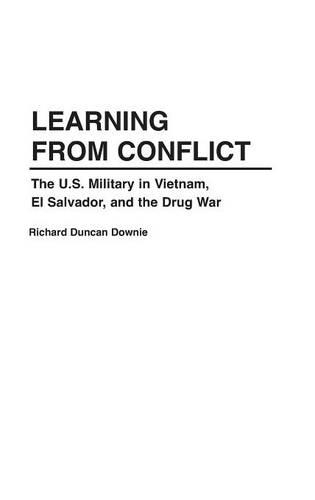
Learning from Conflict: The U.S. Military in Vietnam, El Salvador, and the Drug War
(Hardback)
Publishing Details
Learning from Conflict: The U.S. Military in Vietnam, El Salvador, and the Drug War
By (Author) Richard D. Downie
Bloomsbury Publishing PLC
Praeger Publishers Inc
18th June 1998
United States
Classifications
Tertiary Education
Non Fiction
355.00973
Physical Properties
Hardback
312
Width 156mm, Height 235mm
567g
Description
Why have militaries so often failed to learn from conflict and war Why, for example, despite years of unsuccessful counterinsurgency experiences in Vietnam and El Salvador and repeated recommendations from official Army studies, has the U.S. Army not changed its doctrine for counterinsurgency Writing for scholars as well as military professionals and policymakers, Downie examines the sources of doctrinal change and innovation from a theoretical perspective and derives practical and relevant policy recommendations. Contrasting with other findings in this field, Downie provides case studies showing that neither external pressure on a military nor institutional recognition of the requirement for doctrinal change is sufficient to explain the process of doctrinal change. A military innovates when it learns, by proceeding through a learning cycle that includes achieving an organizational consensus that permits adoption of new approaches that respond to factors that make existing doctrine deficient. When that process is blocked, militaries are left with outmoded doctrinal approaches that constrain military performance and lead to defeat. This is an important study for military leaders, civilian policymakers, and scholars and researchers dealing with contemporary U.S. military issues.
Reviews
.,."[D]ownie's analysis produce[s] comprehensive statistics that identify forces producing doctrinal change within the Army."-Military Review
...[D]ownie's analysis produce[s] comprehensive statistics that identify forces producing doctrinal change within the Army.-Military Review
Colonel Downie's book is required reading....Learning from conflict is a thought-provoking, comprehensive study of the politics and institutional psychology of how U.S. military learns lessons (or can avoid the lessons) of previous conflicts.-Studies in Conflict & Terrorism
Learning From Conflict, as the author suggests, should appeal to those interested in "theoretical as well as policy-relevant aspects of the issues of doctrinal change and innovation in" the military.-The Public Historian
..."Downie's analysis produces comprehensive statistics that identify forces producing doctrinal change within the Army."-Military Review
..."[D]ownie's analysis produce[s] comprehensive statistics that identify forces producing doctrinal change within the Army."-Military Review
"Learning From Conflict, as the author suggests, should appeal to those interested in "theoretical as well as policy-relevant aspects of the issues of doctrinal change and innovation in" the military."-The Public Historian
"Colonel Downie's book is required reading....Learning from conflict is a thought-provoking, comprehensive study of the politics and institutional psychology of how U.S. military learns lessons (or can avoid the lessons) of previous conflicts."-Studies in Conflict & Terrorism
Author Bio
RICHARD DUNCAN DOWNIE is currently Chief of the North and Central America Branch in the office of the U.S. Joint Chiefs of Staff, Strategy, Policy and Plans Directorate. He is also currently serving on the U.S. Delegation negotiating a possible U.S. presence in Panama after 1999. He has held a variety of command and staff positions and has written in scholarly and professional journals.
